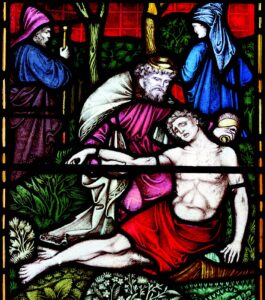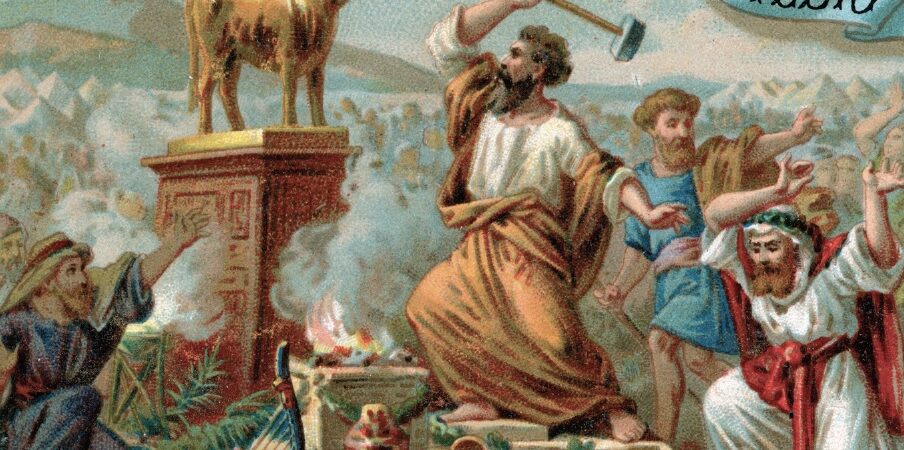Our Mission to Mend
A religious response to the tears and ruptures of contemporary life
Father Richard Gribble Comments Off on Our Mission to Mend
St. Mark’s Gospel records Jesus’ words: “No one sews a piece of unshrunken cloth on an old cloak. If he does, its fullness pulls away, the new from the old, and the tear gets worse. Likewise, no one pours new wine into old wineskins. Otherwise, the wine will burst the skins, and both the wine and the skins are ruined” (2:21-22). This metaphor was useful in the time of Jesus, and it remains a truth in varied applications today. The tearing of the cloth and the rupture of the wineskins are representative of how new ideas — the unshrunken cloth, the new wine — can divide and destroy established structures that have served society well for many generations.
Many positive developments have come about from this tearing and rupture. The constitutional republic of the United States was created by the colonies tearing themselves from British rule, moving away from the monarchical system and replacing it by a more representative democracy. The campaign for women’s suffrage ruptured the idea that men alone should have a voice in American political life. Tearing down the Berlin Wall restored freedom and unity to the German people.
The process of tearing and rupture has also had deleterious effects. On Oct. 31, 1517, the Augustinian monk Martin Luther published his “95 Theses,” and his “protest” led to the first wave of the Protestant Reformation. Four centuries later, Pope St. John XXIII’s call for an ecumenical council tore the Church from its 16th-century Counter-Reformation mentality. Vatican II brought a new day of liturgical renewal, ecumenism and a welcoming attitude toward the modern world. In “The Catholic Revolution: New Wine, Old Wineskins and the Second Vatican Council,” the priest sociologist Andrew Greeley used Jesus’ metaphor to suggest that the new wine of Vatican II was poured into the old wineskin structures of the 16th-century Church, leading to a rupture that in some minds has brought apathy to Church participation, beginning in Europe and spreading both east and west.
Manifestations of the tears and ruptures in contemporary society are ever present, creating significant challenges for the priesthood and religious life. But, fortunately, those who live the religious vocation have the honor of the call and its consequent responsibilities to mend the tears and ruptures we experience in the institutions of human society, as well as in the people we serve. Exploring the contemporary reality of tears and ruptures, and ways to transform these challenges into life-giving ministry, can aid our efforts to proclaim Christ’s message to a world in great need of his love.
In the Bible
The Hebrew Scriptures provide numerous examples of tears and ruptures to both physical things and major institutions. After escape from bondage in Egypt, the Israelites often angered God by their worship of foreign gods. Aware of the religious practices of those whom the Chosen People would encounter in the Promised Land, God instructed Moses: “Tear down their altars; smash their sacred stones, and cut down their asherahs. You shall not bow down to any other god, for the Lord — “Jealous” his name — is a jealous God” (Ex 34:13-14). The Lord’s message was clear: The Hebrews were to always show fidelity to the one true God who had rescued them from slavery in Egypt.
At a low ebb, after the loss of his vast holdings and his family, and understandably frustrated and saddened, “Job arose and tore his cloak and cut off his hair” (Jb 1:20a), an action emblematic of the separation he felt from all that he considered normal. A more significant rupture was the division of the nation of Israel: Angered at Solomon’s worship of false gods, God informed Jeroboam, through the prophet Ahijah, “I am about to tear the kingdom out of Solomon’s hand and will give you ten of the tribes. [Solomon’s son Rehoboam] shall have one tribe for the sake of my servant David” (1 Kgs 11:31b-32). Henceforth, the kingdom of David and Solomon would live in division.
The Gospels also provide examples of tears and ruptures. The aforementioned metaphor used by Jesus in Mark’s Gospel of pouring new wine into new wineskins was a good illustration of how Jesus’ revolutionary teaching could upset the staid applecart of Hebrew society. Jesus truly turned Hebrew society on its head. He reversed the roles by claiming the last will be first and the first will be last (Mk 10:31), that those who exalt themselves will be humbled and those who humble themselves will be exalted (Mt 23:12).

The tears and ruptures depicted in the Bible were mended by those called by God to bring the Lord’s healing presence to all situations, both individually and communally. God called certain people to mend and repair what was damaged. The patriarchs and prophets of the Hebrew Bible were all called by the Lord in specific ways to darn the various holes created in the fabric of God’s plan for his people. God called Abram to journey a long distance, with the promise that he would be the father of a great nation (Gn 12:1-3). He called Moses through the burning bush that was not consumed and instructed him to lead the Israelites from their bondage in Egypt to freedom and unity in the Promised Land (Ex 3:4-22). Many prophets were called by the Lord to proclaim God’s message, often to reluctant people who did not want to hear what God wanted to tell them. Some prophets, like Jonah, answered their initial call reluctantly, but he, like the others, eventually responded to God’s call, seeking to repair the various tears and ruptures in the Hebrew society of their day (Jon 1:1-2; 3:1-3).
Similarly, Jesus called his apostles to mend the tears and ruptures that they might experience in society. As we know, the apostles were not learned, well-known or “significant” people in Jewish society. Rather, they were ordinary, everyday people, most of them fishermen. Some were hotheaded (James and John, the “sons of thunder”), one was a zealot (Simon), one was a tax collector and thus in many ways a Roman sympathizer (Matthew), and one betrayed Jesus to the Jewish religious elite (Judas). Yet Jesus believed they had the required gifts to mend the ruptures and tears of society that they would encounter after his departure. Thus he trained them, by word and deed, to do as he would do, to go forth and bind up what was separated by preaching the Gospel message.
Here and Now
Contemporary society places many great challenges before us, especially those of us who serve God’s people as priests and religious. The message of Scripture both informs and provides direction on how we can find solutions to the various ruptures we experience in contemporary society.
One of the greatest challenges in contemporary society is secularism. The sad reality we encounter daily is a slow but progressive movement away from organized religion. We often hear people today refer to themselves as “spiritual but not religious” — they have been torn away from established religious groups. For many, civil religion has become the foundation of the values and moral compass that guide them. Over time, society has torn itself away from the Christian principles that have guided the advance of Western civilization since the time of Jesus Christ. The recent manifestations of this challenge have played a significant role in the lives of many people.
Repairing the tears and ruptures that secularism has brought to our society and the people of God is not an easy task. Still, priests and religious have both the privilege and the responsibility to preach the Gospel to a secular society with even greater fervor. This can be done in overt ways, as demonstrated by famous preachers and evangelists of the past, but it may also be accomplished in subtle, and possibly even more effective, ways in daily life. When we smile and say good morning to another, we preach the Gospel message and combat secularism. Visiting the sick in hospitals, nursing facilities or their homes is also preaching the Gospel, reversing the secular spread. By performing random acts of kindness, as opposed to random acts of violence, we darn the fabric of the Gospel torn by secularism. Taking the time to be present to another person, even if that simply means listening for five minutes, powerfully preaches the Gospel. We mend the tears and ruptures of secularism by returning to the basics of Christian living.
Worldliness is another major rupture in our society. Yes, we are called to do the best we can with our God-given skills and opportunities to meet the needs of ourselves and our families. But worldliness and its emphasis on the material world tear us away from a greater appreciation for what God has given to us. We give greater time and energy to created things than to the Creator, and this backward way of living tears us away from the Lord.
Related to worldliness is the temptation to emphasize self-achievement over the needs of others. Contemporary society exalts the winner and to achieving the highest possible position. If in the process we trample over others, so be it. Certainly, we should use our gifts and talents well and wisely, but the Darwinian expression “survival of the fittest” lives today.
The tears and ruptures that worldliness and self-achievement create can be mended by placing greater emphasis on simplicity. Priests and religious must guard against worldly tendencies, and by word and deed give others an example that contradicts the so-called wisdom of the world. As Jesus instructed his disciples, “What profit would there be for one to gain the whole world and forfeit his life?” (Mt 16:26a). It is both our responsibility and the privilege of clergy and religious to exhibit a humbler attitude and to set the proper tone for the appropriate use of the world’s goods.

Laziness and apathy also create a large tear, drawing people away from the proper use of their gifts and abilities. Too often today we find people who want others to do all the work; they are not willing to lend a hand. As the parable of the talents suggests, the gifts and opportunities given to us by the Lord are provided only to the degree that we use them properly (Mt 25:14-30). If we fail to utilize gifts and talents appropriately, we will lose them. Thus priests and religious must seek to mend the tears and ruptures in society and individual lives by a dedicated work ethic that shows others a grateful attitude to God for the gifts and opportunities we have been given.
Tears and ruptures are found throughout society, as they have been experienced from the dawn of humanity, but solutions must be found. God called prophets and Jesus called his disciples to mend tears. As these men of faith were commissioned to repair the ruptures in their society, so, too, are priests and religious called today. At the conclusion to the parable of the good Samaritan, Jesus asked the lawyer who was the neighbor to the robbers’ victim. Upon his response — “The one who treated him with mercy” — Jesus instructed him, “Go and do likewise” (Lk 10:37). Priests and religious today should seek to do the same.
FATHER RICHARD GRIBBLE, CSC, is a priest of the Congregation of Holy Cross and presently serves as a professor of religious studies at Stonehill College in North Easton, Massachusetts.





